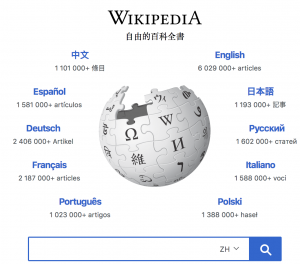The Difference Between Online Educational Content and Openly Licensed Educational Content
Online educational content is the resource which is needed the permission from the author when someone wants to use it. Openly licensed educational content is the resource that the author gives the license or permission to the public to use it under the term of the license. Open licences reserve specific rights and relax others making it easier for educators and course designers to use the resources.
Open Educational Resources (OER) Example
ORE Commons: https://www.oercommons.org/

Wikipedia: https://www.wikipedia.org/

Python: https://www.python.org/
![]()
ORE Review of ORE Commons
- Relevance
“ORE Commons” has a good relevance. There are many subjects with different education levels and standards in the website.
- Accuracy
Since the resources of this website are from the whole world, I cannot make sure those materials written in different languages are accuracy. But I searched comments on “Google” about this website. Most of comments are positive. I do not see any spelling errors or typos when I try to do some simple search on the website. All of materials have the rating option. Most of materials are peer reviewed. Overall, I think this website is accurate.
- Production Quality
I read and watch some materials and videos which have a large number of viewers. Most of them have a clear topic and understandable. Most of their positive ratings are higher than 80%. I think the design features enhance learning because many of them are more like a lecture which can clearly explain problems or solutions for me. For multimedia resources, the audio/video has the high quality. The authors of some low quality videos also provide a “YouTube” link with high quality link.
- Accessibility
The resource is available in alternative formats. However it needs us to create a account to download files. For some high rating video resources, there is a description or a short summary. Some general topic will be divided into detailed topics with subtitles.
- Interactivity
I think the resource encourages active learning and class participation. Viewers can leave their comments below the materials or videos. The author and other viewers can answer questions freely. In my search, I did not find any opportunities to test the understanding of the material.
- Licensing
Most of materials in this website are allowed for educational reuse. Only those materials that shared within groups are not reusable for education. Since the website is more like the library, we cannot modify the origin materials. But we can make the resource better fit our class objectives.
ORE Review of Wikipedia and Python
I put these two ORE resources together because they are similar. They are both powerful. They both have good relevance, high accuracy and free accessibility. “Python” has higher accuracy than “Wikipedia” because “Python” is a official resource which is updated by developers. But “Wikipedia” is a website that everyone can modify it. In addition, we know that we can find any knowledge we want to know from the “Wikipedia” but we cannot use it as the reference in any research papers. All of materials in these two websites are allowed for educational reuse. Both of them have a good interactivity. Users can leave and search questions and comments in “FAQ” page.
The difference between “Wikipedia” and “Python” is that “Python” is more official and reliable because I cannot make sure everything in “Wikipedia” is correct. Additionally, the page will not exist if no one create it in “Wikipedia”. “Python” is the resource that I can find all usable python codes and formulas with different versions (usually Python 2.7 and Python 3.0). And it is up-to-date when the bug or new version comes out.
My Use of OER
The OER I used frequently are “Wikipedia” and “Python”. Since my major is computer science, I often use “Wikipedia” to search the algorithm and definitions of some terms. I only need to understand the material I searched in “wiki” at most time. In addition, “Wikipedia” is a good resource in my daily life. I often use it to search something I do not know while watching films or reading articles.
“Python” is very helpful when I am writing codes. And I often use “Python” and “GeeksforGeeks”, a social learning community, together. “Pyhthon” is a good resource for formulas and “GeeksforGeeks” is a good forum for examples. “Python” is more like a catalogue for me to use the “GeeksforGeeks”.
GeeksforGeek: https://www.geeksforgeeks.org/
![]()